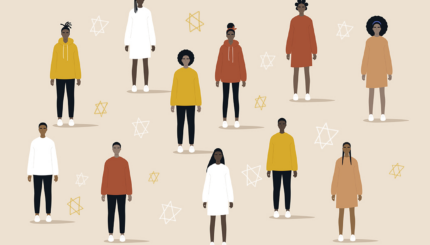While many adults identify the experience of their own Jewish education as a turn-off from Jewish involvement, they often marvel at the sophistication and variety of what is being offered to their children, grandchildren, and themselves as adult learners today.
One recent major thrust has been an emphasis on early childhood education. The Jewish Early Childhood Education Partnership, a recently formed non-profit advocacy and educational organization dedicated to putting Jewish early childhood education on the national Jewish communal agenda, estimates that approximately 100,000 Jewish children between birth and six years of age (out of an estimated 700,000) are in a Jewish early childhood programs in North America.
 These programs are offered through individual congregations, Jewish community centers (JCCs), and Federation-sponsored day care services, and usually include a focus on
and other holidays. Some programs also offer Hebrew immersion classes for children as young as age three. Other programs, such as Hadassah’s “Training Wheels” program, in which parents and young children come together for monthly holiday celebrations, and synagogue “Tot Shabbats,” attempt to build a positive Jewish experience from infancy.
These programs are offered through individual congregations, Jewish community centers (JCCs), and Federation-sponsored day care services, and usually include a focus on
and other holidays. Some programs also offer Hebrew immersion classes for children as young as age three. Other programs, such as Hadassah’s “Training Wheels” program, in which parents and young children come together for monthly holiday celebrations, and synagogue “Tot Shabbats,” attempt to build a positive Jewish experience from infancy.
Once children reach school-age, parents are faced with another important choice: to send them to public, private or Jewish day school. The day school movement, once limited to the Orthodox community, has grown by leaps and bounds over the last twenty years. According to the Partnership for Excellence in Jewish Education (PEJE), an organization dedicated to strengthening day school education in North America, there are currently 700 Jewish day schools in North America with an enrollment approaching 200,000 students.

Help us keep Jewish knowledge accessible to millions of people around the world.
Your donation to My Jewish Learning fuels endless journeys of Jewish discovery. With your help, My Jewish Learning can continue to provide nonstop opportunities for learning, connection and growth.
While almost half of these schools affiliate with the Orthodox movement, the other roughly 350 include independent, non-denominational schools, Jewish Montessori-style schools, Solomon Schecter schools (affiliated with the Conservative movement), and Reform day schools. (The Reconstructionist movement is also currently planning its first day school.) While most of these schools are located in major metropolitan areas, some smaller Jewish communities, in modest-size cities like Reading, Pennsylvania, are building day school options.
Parents who send their children to supplementary (afternoon and Sunday) schools for their primary Jewish education are often quite surprised to discover that these institutions are very much changed since their own childhood days. Jewish educators are working hard to find the most effective ways to provide a Jewish education in only two to six hours per week and making strides towards creating innovative, effective models for Jewish learning. Many schools are turning towards more experiential education, in which students learn Jewish studies through the creative arts. Other schools take students for overnight Shabbatons (Shabbat retreats) several times during the year, immersing them in a Jewish learning (as well as social) experience.
Within supplementary schools, there is also a trend to parallel public schools in emphasizing service learning. Many religious schools take on a special service project for the year and emphasize Judaism’s focus on tikkun olam (repairing the world) through hands-on learning.
Family education offers parents some of the learning that they may have missed during their own Hebrew school days. Many supplementary schools have programs in which parents participate in learning alongside their children during several special programs throughout the year. Some schools give “homework” that involves the whole family in Jewish learning and practice.
Adults without children, those whose children are grown, and other adults interested in a Jewish education for themselves are not excluded from the educational picture. Adult education—an emphasis on building a “community of learners”—is on the rise in synagogues across the denominations. From Jewish book clubs to study “Lunch and Learns” at urban JCCs for professionals who can step out of the office for an hour or two of study, educators are finding creative ways to bring Jewish learning to their constituents. JCCs are also starting to attract unaffiliated Jews through the creation of sophisticated film and book festivals.
For more on this topic, search the publications of our partner, the Berman Jewish Policy Archive:


